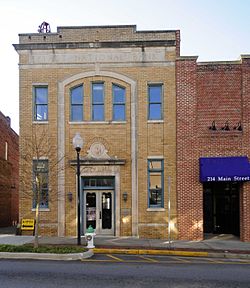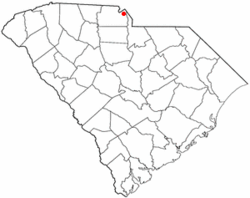Fort Mill, South Carolina
| Fort Mill, South Carolina | |
|---|---|
| Suburban Town | |

Fort Mill Historic District
|
|
 Location of Fort Mill in the state of South Carolina. |
|
| Coordinates: 35°0′N 80°57′W / 35.000°N 80.950°WCoordinates: 35°0′N 80°57′W / 35.000°N 80.950°W | |
| Country | United States |
| State | South Carolina |
| Counties | York |
| Established | 1873 |
| Government | |
| • Type | Mayor-council |
| • Mayor | Guynn Savage, since 1/2016 |
| Area | |
| • Suburban Town | 4.6 sq mi (12.0 km2) |
| • Land | 4.6 sq mi (11.8 km2) |
| • Water | 0.1 sq mi (0.2 km2) |
| Elevation | 633 ft (193 m) |
| Population (2010) | |
| • Suburban Town | 10,811 |
| • Density | 1,662.7/sq mi (642.0/km2) |
| • Urban | 36,119 |
| Time zone | Eastern (EST) (UTC-5) |
| • Summer (DST) | EDT (UTC-4) |
| ZIP codes | 29715, 29716 |
| Area code(s) | 803 |
| FIPS code | 45-26890 |
| GNIS feature ID | 1247805 |
| Website | www |
Fort Mill, also known as Fort Mill Township, is a suburban town in York County in the U.S. state of South Carolina, and a suburb of the city of Charlotte, North Carolina, and is near Rock Hill. Approximately 13,662 people live inside the town's corporate limits as of the 2015 Census Estimates with a total of 36,119 people residing within the entire urban area.
Fort Mill township is home to notable businesses such as Continental Tire the Americas, LLC., Domtar, Mood Media, Springs Industries, AECOM, and serves as the headquarters of Carolina Crown Drum and Bugle Corps, DCI World Champions in 2013.
The town of Fort Mill was established in 1873, taking its name from a colonial-era fort built by the British and a grist mill on nearby Steele Creek. The Catawba Indians made their home in present-day Fort Mill for many years. Scotch-Irish settlers began arriving in the 1750s and 1760s and a small settlement soon developed. Fort Mill grew rapidly in the late 19th century as textile mills were established. After many textile mill shut-downs the town continued to grow rapidly and became a major suburb of Charlotte.
Highlights in Fort Mill's history include:
The Banks-Mack House, Fort Mill Downtown Historic District, Mack-Belk House, Mills House, Nation Ford Road, National Guard Armory, Spratt Cemetery, Springfield Plantation House, Thornwell-Elliott House, Unity Presbyterian Church Complex, John M. White House, William Elliott White House, and Wilson House are listed on the National Register of Historic Places.
...
Wikipedia
